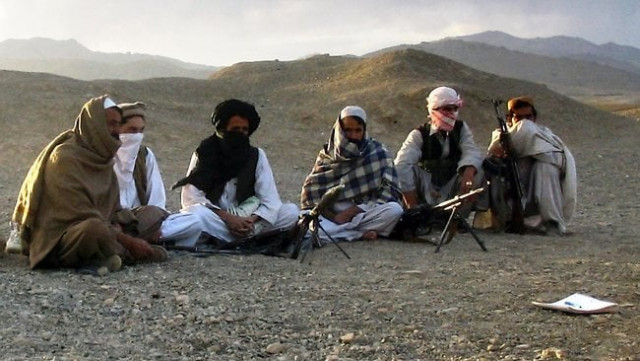In Kabul, scepticism clouds direct talks
Rare meeting slated for March but necessary homework not done yet

PHOTO: AFP
There is considerable uncertainty in Afghanistan regarding the fate of an intra-Afghan dialogue despite a certain degree of optimism about the long-awaited peace process.
Afghan officials familiar with a four-nation initiative told The Express Tribune that negotiations could be a long-drawn-out affair, adding that expecting the talks to start in a few days was an unfair assessment.
Upcoming Afghan talks 'a positive signal': PM
A source, meanwhile, denied Afghan officials have shared with Pakistan a list of ‘influential’ Taliban leaders that Kabul wants to see at the negotiating table.
During its fourth meeting on February 23 in Kabul, the Quadrilateral Coordination Group (QCG) had invited Taliban factions and Hizb-e-Islami, the second largest Afghan resistance group, to join the talks by the first week of March in Islamabad. The QCG is made up of top officials from Afghanistan, China, Pakistan and the United States.
Sources in Kabul said on Sunday the QCG members that approached the Taliban’s political office in Qatar had informed the meeting that the militia was ‘not very keen’ on joining the proposed talks.
The QCG meeting in Islamabad had agreed on February 6 to approach the main Taliban faction in Qatar and the splinter group under Mullah Rasool’s command for their feedback to the participants of the Kabul meeting.
“The US ambassador in Kabul, who represented his country at the fourth QCG meeting, told participants that he had received no briefing from Washington,” a source, who attended the meeting, told The Express Tribune.
“The Chinese ambassador to Afghanistan informed the meeting that they had contacted the Taliban representatives in Qatar, but while they seemed unwilling to join the talks, they did not refuse outright to join the process.”
Afghanistan warns insurgent groups of action in case of failure to join peace process
He said Pakistan had talked to Taliban’s political representatives “but they are not keen on sitting across the table with Kabul. The Afghan side also confirmed they have sent messages to Taliban groups and Hizb-e-Islami, but they are still awaiting their response.”
Pakistan has said that the Taliban have reiterated their demands that an end to ‘foreign invasion’ be on the agenda, their political office in Doha be allowed to operate, names of their leaders be delisted from the UN sanctions list and their prisoners be freed, added the source.
“The Taliban have also called for a safe passage to their negotiators, and made it clear their leaders would not be able to travel in view of international travel curbs.”
The source did not rule out a delay of a few days or even a week in the proposed direct talks in the wake of the Taliban’s stance. “As the Taliban’s negotiators are in the market, anyone can contact them and they would get a mandate from their top leadership. It was a shared responsibility of all involved in the quadrilateral process.”
The source said the QCG had accepted Afghanistan’s request to set a date for talks within the first week of March because they are seriously concerned that fighting might intensify as the weather turns warmer. “The US, China and Pakistan did not agree to the timeline, but Afghanistan insisted on it.”
Meanwhile, Afghan sources say they would not opt for any confidence-building measures or incentives until the Taliban came to the negotiating table.
Afghan peace process: Kabul wants 10 ‘influential’ Taliban on the table
A Taliban source in Qatar had earlier said it would be ‘difficult’ for the group to join negotiations if certain steps were not taken ahead of the talks.
No Taliban list
Azadi Radio — formerly Radio Free Afghanistan — had quoted an unnamed Afghan official as saying that a list of at least 10 Taliban leaders had been shared with Pakistan with a request to encourage them to join the talks.
However, the source in Kabul disputed the claim that such a list was shared with Pakistan during the February 23 meeting in the Afghan capital.
A group from Pakistan arrived in Kabul on Sunday to attend the next round of non-government security dialogue ‘Beyond Boundaries’ — a major Afghanistan-Pakistan track 1.5/II initiative launched by the Islamabad-based Centre for Research & Security Studies.
Initiated in partnership with its Afghan counterpart Duran Research & Analysis and sub-national partner Foundation for Integrated Development Action, the dialogue is an effort to improve relations between Afghanistan and Pakistan, soothe bitter context, tackle trust deficit that can somehow de-escalate the heightened tensions, and improve mutual perceptions.
Published in The Express Tribune, February 29th, 2016.



















COMMENTS
Comments are moderated and generally will be posted if they are on-topic and not abusive.
For more information, please see our Comments FAQ